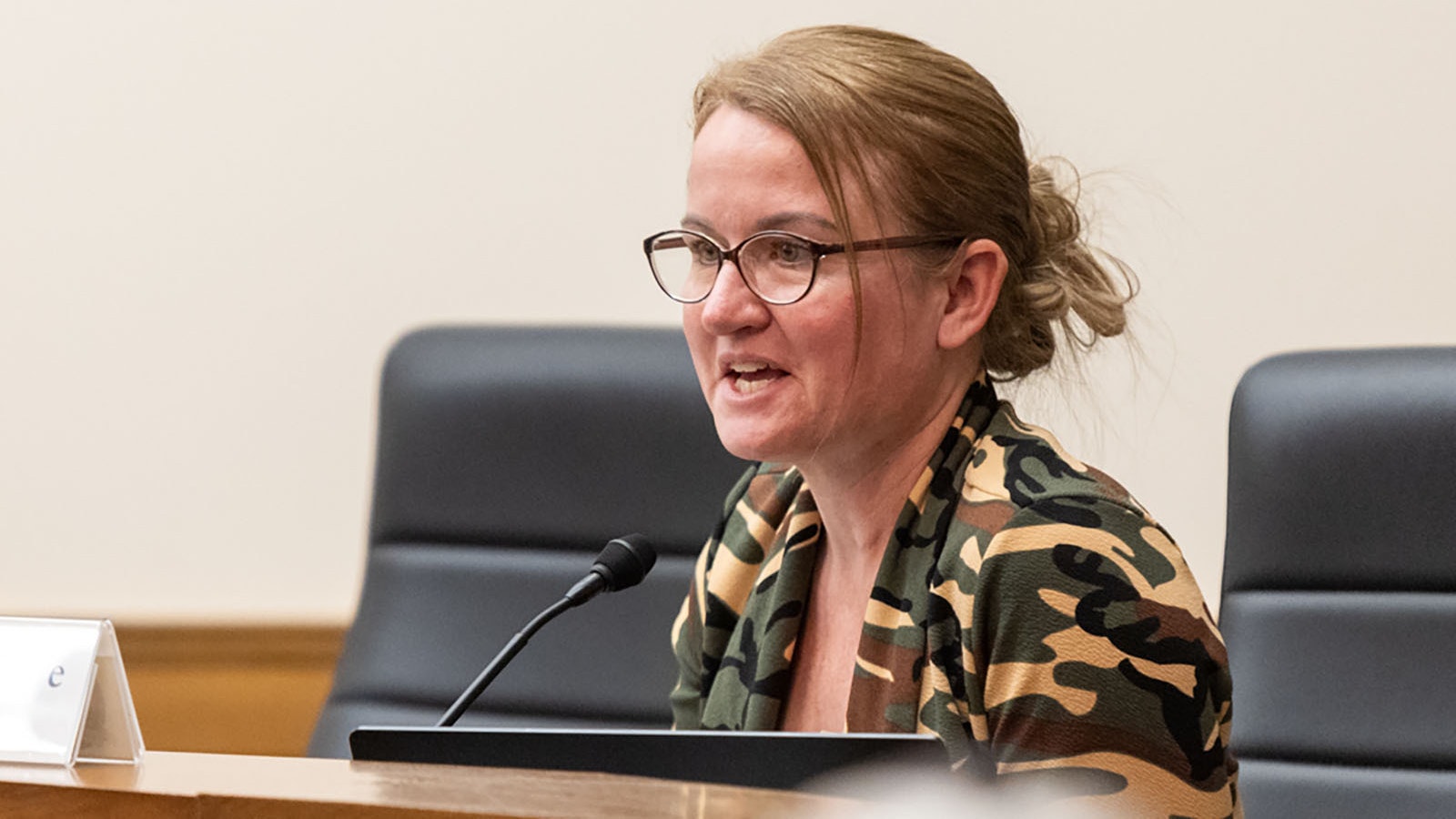The Wyoming Legislature isn’t taking no for an answer and plans to bring back a bill that Gov. Mark Gordon vetoed last year with almost no changes made to it.
The Joint Revenue Committee advanced draft legislation at its meeting on Monday that, if passed into law, would cut property taxes by 25% for single-family residential home values of $2 million or less
The bill is almost identical to the legislation Gordon already vetoed earlier this year.
In his veto letter, Gordon called the bill “socialistic” and a “Bidenomic-type of tax relief” in reference to President Joe Biden.
The committee passed the bill on an 11-3 vote on Monday. If passed into law, it would go into effect for the upcoming tax year and expire in June 2027.
State Sens. Tim French, R-Powell; Bob Ide, R-Casper; Troy McKeown, R-Gillette; Bo Biteman, R-Ranchester; and Reps. John Bear, R-Gillette; Andrew Byron, R-Jackson; Tony Locke, R-Casper; David Northrup, R-Powell; Tomi Strock, R-Douglas; Liz Storer, D-Jackson; and Steve Harshman, R-Casper, voted in support of the bill.
Sen. Stephan Pappas, R-Cheyenne; and Reps. Ember Oakley, R-Riverton; and Dan Zwonitzer, R-Cheyenne, voted against it.
The bill appropriates up to $225 million per year from the general fund and Legislative Stabilization Reserve Account to the Department of Revenue to reimburse local governments and schools to make up for lost revenue from the exemption. The sourcing of this money is exactly what Gordon didn’t like about the bill.
What’s The Issue?
Oakley said she sees some logic in Gordon’s argument, saying there’s a “robbing Peter to pay Paul” aspect of the bill.
What Gordon and Oakely are referring to is the fact that mineral revenues pay for about half of Wyoming state government funding, so a significant portion of the tax relief bill would be funded on the back of the energy sector, without giving any reciprocal relief to that industry.
Biteman, co-chair of the Revenue Committee, took a different perspective, explaining that the bill was brought as a direct response to huge property tax increases and inflationary pressures across Wyoming.
“This bill was more of a make people whole and wipe out some of that inflation we saw from 2019 to the present day,” he said.
But Zwonitzer pointed out that inflationary pressures hit every segment of society, including schools and governments.
By The Numbers
Total property tax revenue, which includes mineral proceeds, actually dropped by about 6.4% in Wyoming in 2024 from 2023.
Residential property tax revenue increased by about 6% in 2024, marking a significant slow down after double-digit percentage property tax increases were seen in many Wyoming counties in 2022 and 2023, representing a much larger growth than historical norms.
This year, only two counties saw double-digit percentage increases and a couple even saw their taxes decrease.
Property tax growth ballooned in Wyoming after the COVID-19 pandemic. Assessed valuations for residential properties in Wyoming was $5.8 billion in 2019. This year they reached $10.1 billion.
“That’s a windfall for all these taxing authorities but it’s killing our constituents and that’s who was telling us they wanted something done,” Biteman said.
Bear agreed, arguing that Wyoming has been significantly taxing homeowners on “unearned income” over the past three years while simultaneously putting a significant amount of money into savings during that same timeframe.
The legislation brought earlier this year that Gordon vetoed, Senate File 54, was one of a handful of property tax bills to get across the finish line.
Another bill passed into law this year that the governor did accept put a 4% cap on year-to-year residential property tax increases, which cut property tax revenue by $18.9 million, of which about $13 million was supposed to go to public education, according to the Wyoming Department of Revenue.
Brenda Henson, director of the Department of Revenue, said the cap only benefitted about 40% of homeowners as the remainder saw their taxes increase by less than 4%.
Substantial changes were made to SF 54 shortly before it passed, which Oakley saw as a rushed process.
The only change made to the bill on Monday expanded it from an exemption on single family residences to also associated land. Bear estimated this would increase the biennial fiscal impact of the bill to $300 million.
Oakley also said the bill does nothing to resolve underlying issues with property taxation in Wyoming, while costing the state a significant amount of lost revenue each year.
Storer, who despite voting for the bill on Monday and earlier this year, told Cowboy State Daily she tends to agree and questions the constitutionality of any property exemption bill passed in Wyoming. The Wyoming Constitution states that all taxation in the state must be fair, equal and uniform.
She believes the constitutional amendment passed by voters this fall will open up much better opportunities for addressing property tax relief. That amendment created a separate class of taxation for residential properties in Wyoming, which will theoretically give legislators more flexibility to reduce property taxes in the state.
“I think with Amendment A passing, there are ways that are constitutional for us to address property taxes,” she said.

The Gordon Factor
The fact that the bill Gordon vetoed was almost completely unchanged is what stuck out to Zwonitzer.
“We didn’t answer any of the questions or problems he posed, or try to amend it in any way, we’re just going to try and have the committee re-sponsor the vetoed bill?” Zwonitzer questioned.
Bear responded to this concern, saying “ the executive doesn’t always get it right.”
“Sometimes it takes a tenacity of the Legislature to ensure the people are represented, and we are the closest to the people,” he said.
A two-thirds majority is needed in both chambers of the Legislature to override a governor’s veto.
The Legislature likely had these numbers when Gordon issued his veto earlier this year, but doing so would have required the calling of a special session, as the Legislature had already adjourned. As a result of this year’s elections, the Legislature moved farther to the right and became even more likely to override a veto on this bill.
Other Property Tax Bills To Watch For
The Revenue Committee also passed a bill revising the 4% cap on Monday, changing it to the rate of annual inflation or 3%, whichever is lower.
The committee also passed a bill lowering the maximum gross income someone could make and qualify for the state’s Property Tax Refund Program.
The Property Tax Refund Program received 5,063 more applicants for the 2023 tax year than 2022. There were 13,485 applications that qualified for a refund, amounting to $14.2 million in refunds given out at a rate of $1,058 per refund.
“Oh the difference a year makes,” Henson said.
The committee also voted 9-5 to remove a 2-year expiration date on a bill passed earlier this year providing long term homeowners a 50% property tax exemption.
As of Friday, Henson said 14,500 homeowners had applied for this exemption, which could result in as much as $17 million in refunds. The state has no mechanism in place to cover this lost revenue.
The committee also advanced a bill stating that if a person owns $50,000 or less in fair market value of business property in one county, the business property shall be exempt from property taxes.
It also passed a bill making fair market value and depreciation schedules the determining factors for assessing tangible personal property.
Bills lowering the industrial tax rate and exempting up to $1 million of residential home values were rejected by the committee, as was a bill stating that "fair market value" for tangible personal property shall be determined based upon the price that was paid for a property and its depreciation over time.
Leo Wolfson can be reached at leo@cowboystatedaily.com.





